|
De Nederlandse dichter Lucebert werd in Amsterdam geboren op 15 september 1924 onder de naam Lubertus Swaanswijk. Zie ook mijn blog van 15 september 2010 en eveneens alle tags voor Lucebert op dit blog.
Vrede is eten met muziek
Vredig eten is goed eten
Want lekker eten doet men alleen in rust en vrede
Voor een goede spijsvertering is het een vereiste
Dat men elk hapje minstens vijftienmaal kauwt
Daarom eet men met muziek ook beter
Want onder vrolijke tonen bewegen de kaken vanzelf
Harmonieus en met de kaken ook de slokdarm
En later zelfs de overige dertig meter
Lange darmen in de buik
Vrede is goed eten met goede muziek
Met marsmuziek kan men beter lopen dan eten
Als men dan ook maar vredig loopt
En niet meemarcheert met een troep soldaten
Tegen andere soldaten
Dan is marsmuziek net zo bedorven
Als besmet voedsel
Maar bij dansmuziek is het zeker goed eten
Want dansen is geen vechten
Wie danst houdt rekening met andere dansers
Zoals men onder het eten niet alle
Lekkere hapjes alleen verorbert maar die deelt
Met overig disgenoten.
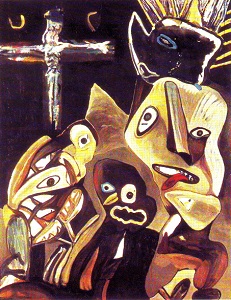
Lucebert, En zij wendden zich af van het kruis, 1985
Van de econoom
onverschrokken bij braindrain de schoonprater
springt van nest naar vogel en blijft opgetogen
in de spaghetti van glossolalie lepelen
bepaalde aspecten moeten worden meegenomen
als je niet bepaalde effecten voorkomt
maar kunnen ook blijven liggen als vorm van antwoord
zoals de schepping ook is bepaald die met mensen in de supermarkt
al te toevallige offers heeft afgewend daar komen we onszelf tegen
in de ethiek van het economisch leven
zorgvuldig produceren en consumeren
er is een omslag ontstaan in de omgang
een kwestie van gewenning
invulling van verantwoordelijkheden meer vulsel
dat uitspruit tot vullus
toegevoegde waarde
strijkstok van strijkages
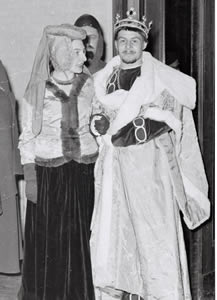
Lucebert (15 september 1924 - 10 mei 1994)
Lucebert, verkleed als Keizer der Vijftigers, 1954
De Nederlandse dichter en schrijver Jan Jacob Slauerhoff werd geboren in Leeuwarden op 15 september 1898. Zie ook mijn blog van 15 september 2010 en eveneens alle tags voor Jan Slauerhoff op dit blog.
En zoveel schande werd in liefdes naam
En zoveel schande werd in liefdes naam
Met rein gelaat, gemeen gemoed bedreven,
Dat ik mij vaak genoeg voor liefde schaam
En walging mij belt om voor te leven.
Een felle blos, een bloedgolf stijgt naar ‘t hoofd,
het wordt mij beurtlings rood en zwart voor ogen.
Ach, alles wat geluk is wordt geroofd,
Bevochten op almachtige gier en logen.
Maar voor een ogenblik bezinning keert,
Men weet weer de verruklijke engel veil
Voor alles wat zij maar op aard begeert,
En reinheid zoekt weer in verdriet zijn enig heil.
Kindervrage
In de hemel staan de sterren
Als kinderen in de verre
Somber overwolkte heide
Waar zij grazend zich verspreiden
Voor het verschiet.
Hoe komt het dat zij niet verdwalen?
Wel is de Maan een strenge herder
Maar de hond die ze, als ze verder
Gaan dan mag, terug moet halen,
Is er niet.
Waarom gaan ze dan niet zoeken
Uit den hemel, in den hoeken
Van ’t heelal, wat zich daarachter
Mag verschuilen, waar geen wachter
Hun verbiedt?
Waarom zijn ze bang gehoorzaam,
Blijven ze in kudde’ ervoor staan?
Als de maan met lome stralen
Hen toch wel niet in kan halen,
Waarom gaan ze dan niet dwalen,
Waarom niet?
De ontdekker
Hij had het land waarvoor hij scheep ging lief,
Lief, als een vrouw 't verborgen komende.
Er diep aan denkend stond hij dromende
Voor op de plecht en als de boeg zich hief
Was 't hem te moede of 't zich reeds bewoog
Onder de verten, waarin 't sluimerde,
Terwijl 't schip, door de waterscheiding schuimende,
Op de aanbrekende geboort' toevloog.
Maar toen het lag ontdekt, leek het verraad.
Geen stille onzichtbre streng verbond hen tweeën.
Hij wilde 't weer verheimlijken - te laat:
Het lag voor allen bloot. Hem bleef geen raad
Dan voort te varen, doelloos, desolaat
En zonder drift - leeg, over lege zeeën.
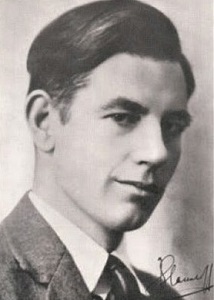
Jan Slauerhoff (15 september 1898 – 5 oktober 1936)
De Nigeriaanse schrijfster Chimamanda Ngozi Adichie werd geboren op 15 september 1977 in Enugu. Zie ook mijn blog van 15 september 2010 en eveneens alle tags voor Chimamanda Ngozi Adichie op dit blog.
Uit: Half of a Yellow Sun
"Oh, yes, you have brought the houseboy. I kpotago ya." Master's Igbo felt feathery in Ugwu's ears. It was Igbo colored by the sliding sounds of English, the Igbo of one who spoke English often.
"He will work hard," his aunty said. "He is a very good boy. Just tell him what he should do. Thank, sah!"
Master grunted in response, watching Ugwu and his aunty with a faintly distracted expression, as if their presence made it difficult for him to remember something important. Ugwu's aunty patted Ugwu's shoulder, whispered that he should do well, and turned to the door. After she left, Master put his glasses back on and faced his book, relaxing further into a slanting position, legs stretched out. Even when he turned the pages he did so with his eyes on the book.
Ugwu stood by the door, waiting. Sunlight streamed in through the windows, and from time to time a gentle breeze lifted the curtains. The room was silent except for the rustle of Master's page-turning. Ugwu stood for a while before he began to edge closer and closer to the bookshelf, as though to hide in it, and then, after a while, he sank down to the floor, cradling his raffia bag between his knees. He looked up at the ceiling, so high up, so piercingly white. He closed his eyes and tried to reimagine this spacious room with the alien furniture, but he couldn't. He opened his eyes, overcome by a new wonder, and looked around to make sure it was all real. To think that he would sit on these sofas, polish this slippery-smooth floor, wash these gauzy curtains.
"Kedu afa gi? What's your name?" Master asked, startling him.
Ugwu stood up.
"What's your name?" Master asked again and sat up straight. He filled the armchair, his thick hair that stood high on his head, his muscled arms, his broad shoulders; Ugwu had imagined an older man, somebody frail, and now he felt a sudden fear that he might not please this master who looked so youthfully capable, who looked as if he needed nothing.”

Chimamanda Ngozi Adichi (Enugu, 15 september 1977)
De Britse schrijfster Agatha Christie werd geboren in Torquay (Devon) op 15 september 1890. Zie ook mijn blog van 15 september 2010 en eveneens alle tags voor Agatha Christie op dit blog.
Uit: The Mysterious Affair at Styles
“Their country-place, Styles Court, had been purchased by Mr. Cavendish early in their married life. He had been completely under his wife’s ascendancy, so much so that, on dying, he left the place to her for her lifetime, as well as the larger part of his income; an arrangement that was distinctly unfair to his two sons. Their step-mother, however, had always been most generous to them; indeed, they were so young at the time of their father’s remarriage that they always thought of her as their own mother.
Lawrence, the younger, had been a delicate youth. He had qualified as a doctor but early relinquished the profession of medicine, and lived at home while pursuing literary ambitions; though his verses never had any marked success.
John practiced for some time as a barrister, but had finally settled down to the more congenial life of a country squire. He had married two years ago, and had taken his wife to live at Styles, though I entertained a shrewd suspicion that he would have preferred his mother to increase his allowance, which would have enabled him to have a home of his own. Mrs. Cavendish, however, was a lady who liked to make her own plans, and expected other people to fall in with them, and in this case she certainly had the whip hand, namely: the purse strings.
John noticed my surprise at the news of his mother’s remarriage and smiled rather ruefully.
“Rotten little bounder too!” he said savagely. “I can tell you, Hastings, it’s making life jolly difficult for us. As for Evie—you remember Evie?”
“No.”
“Oh, I suppose she was after your time. She’s the mater’s factotum, companion, Jack of all trades! A great sport—old Evie! Not precisely young and beautiful, but as game as they make them.”
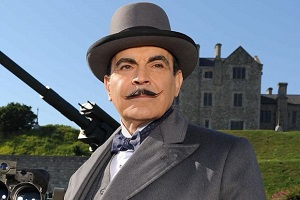
Agatha Christie (15 september 1890 – 12 januari 1976)
David Suchet als Hercule Poirot
De Jamaicaanse dichter en schrijver Festus Claudius " Claude " McKay werd geboren op 15 september 1890 in Sunny Ville, Clarendon, Jamaica. Xie ook alle tags voor Claude McKay op dit blog.
A Memory of June
When June comes dancing o'er the death of May,
With scarlet roses tinting her green breast,
And mating thrushes ushering in her day,
And Earth on tiptoe for her golden guest,
I always see the evening when we met--
The first of June baptized in tender rain--
And walked home through the wide streets, gleaming wet,
Arms locked, our warm flesh pulsing with love's pain.
I always see the cheerful little room,
And in the corner, fresh and white, the bed,
Sweet scented with a delicate perfume,
Wherein for one night only we were wed;
Where in the starlit stillness we lay mute,
And heard the whispering showers all night long,
And your brown burning body was a lute
Whereon my passion played his fevered song.
When June comes dancing o'er the death of May,
With scarlet roses staining her fair feet,
My soul takes leave of me to sing all day
A love so fugitive and so complete.
A Prayer
'Mid the discordant noises of the day I hear thee calling;
I stumble as I fare along Earth's way; keep me from falling.
Mine eyes are open but they cannot see for gloom of night:
I can no more than lift my heart to thee for inward light.
The wild and fiery passion of my youth consumes my soul;
In agony I turn to thee for truth and self-control.
For Passion and all the pleasures it can give will die the death;
But this of me eternally must live, thy borrowed breath.
'Mid the discordant noises of the day I hear thee calling;
I stumble as I fare along Earth's way; keep me from falling.
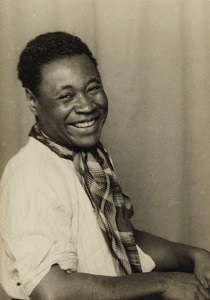
Claude McKay (15 september 1890 - 22 mei 1948)
De Turkse schrijver Orhan Kemal (eig. Mehmet Raşit Öğütçü) werd geboren op 15 september 1914 in Ceyhan. Zie ook mijn blog van 15 september 2010 en eveneens alle tags voor Orhan Kemal op dit blog.
Uit: The Idle Years (Vertaald door Cengiz Lugal)
“The waiter brought his dolma.
‘I’ll have a bowl of soup, please,’ I said.
Nejip came over much later when his shift was done. The streets were full of tobacco workers and their hubbub. I would love to have been one of their rusty-brown, dirty but none the less cheerful crowd.
Nejip kept asking us questions, laughing and being happy. ‘We can go and see some games. You wouldn’t believe some of the matches they have. Which club are you going to go to? I’d say you should get yourselves into Fenerbahçe. You see Fenerbahçe…’
Gazi and I exchanged glances and smiled to ourselves.
‘So which hotel are you staying in?’ Nejip asked, after we’d had God knows how many coffees. ‘Is it a nice, clean place?’
Gazi winked at me. ‘Very clean,’ he said.
‘Well, you can stay with me for tonight anyway. Come on then… Do we have to let the hotel know?’
‘Not really,’ said Gazi and burst out laughing. ‘What hotel, mate? How would we be in a hotel? We’ve been lucky to have a floor to crash on!’
‘Whose floor have you been crashing on?’
‘We met this guy called Nevzat. We’re on the floor in his room.’
‘He shovels coal for a living.’
‘And I thought that…’ Nejip began and then stopped. He started walking off and beckoned to us to follow.
Well, whatever he had thought, it didn’t stop him being the perfect host.”
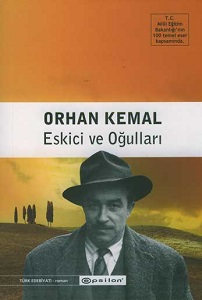
Orhan Kemal (15 september 1914 – 2 juni 1970)
Cover
Zie voor nog meer schrijvers van de 15e september ook mijn blog van 15 september 2013 deel 2.
|



